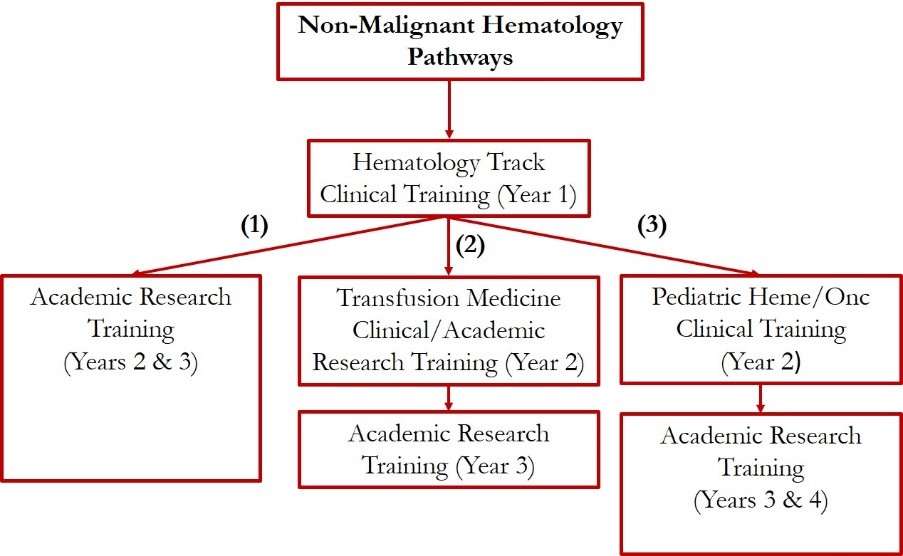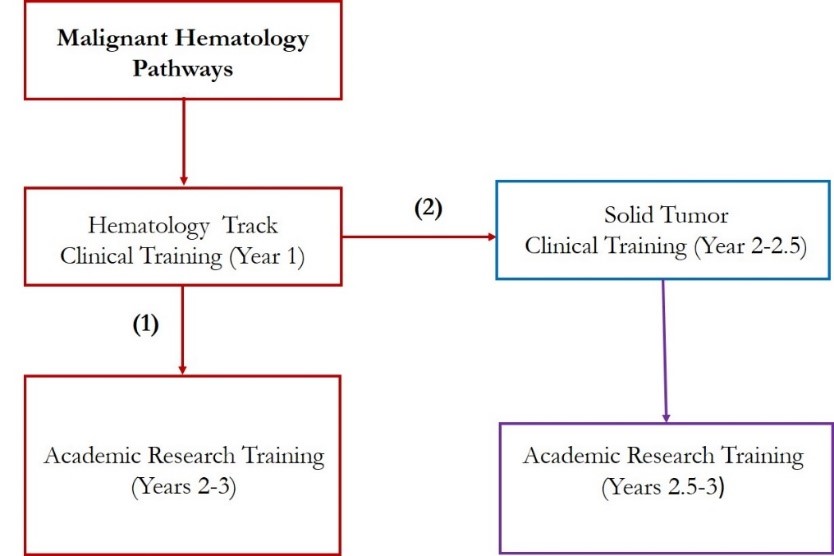Hematology Track
The Hematology Track at Johns Hopkins is the foremost leader in fellowship training for non-malignant and malignant hematology. We have developed a unique curriculum that provides unparalleled breadth of experience and flexibility. All fellows receive immersive inpatient and outpatient clinical training in Hematology followed by the option to:
Enter directly into academic research training or
- Obtain additional training to receive dual-certification in a complementary discipline such as:
- Medical Oncology
- Transfusion Medicine or
- Pediatric Heme-Onc (med-peds applicants only)
Clinical Training (Year 1)
-
Rotation Subject What to Expect Non-Malignant Hematology Inpatient Service (Heme4)
Unique exclusive non-malignant hematology inpatient and consult service. Provides extensive training in management of wide breadth of non-malignant hematologic diseases including coagulation disorders, thrombotic microangiopathies, hemophilia, immune cytopenias, bone marrow failure, and complex sickle cell disease.
Leukemia Service
Inpatient acute leukemia service. Provides comprehensive training in standard and trial chemotherapeutic regimens for newly diagnosed or relapsed acute myeloid leukemia (AML), acute lymphoblastic leukemia (ALL), and high-grade myelodysplastic syndrome (MDS).
Myeloma, Transplant, & Lymphoma (MTL) Service
Inpatient bone marrow transplant (BMT) service for malignant and non-malignant disorders. Provides immersive training in a wide spectrum of BMT techniques, including autologous, allogeneic, matched-unrelated, and haploidentical.
-
Rotation Subject What to Expect Sickle Cell Disease
Immersive experience in management of sickle cell disease through the Comprehensive Sickle Cell Center for Adults at Johns Hopkins. Provides multi-disciplinary training in various practice settings including outpatient clinics, consult service, and sickle cell infusion center.
Transfusion Medicine
Unique rotation led by the Division of Transfusion Medicine. Provides training in theoretical and practical concepts of blood banking, reference immunohematology, platelet serology, transfusion consultations, and therapeutic apheresis.
Coagulation
Fundamental experience led by the Department of Pathology. Provides targeted training in essential principles of laboratory medicine including interpretation of coagulation tests, platelet aggregometry, and hemoglobin electrophoresis.
Hematopathology
Practical rotation in hematopathology techniques. Provides fellows with proficiency in performing bone marrow biopsies and interpreting bone marrow aspirates, flow cytometry, and lymph node biopsies.
Outpatient Hematology Clinics (Heme OPD)
Innovative outpatient clinic experience in complex hematology, including non-malignant hematologic conditions such as hemophilia, clotting disorders, thrombotic microangiopathies, and cytopenias as well as malignant disorders such as myeloid and lymphoid neoplasms.
Palliative Care
Immersive experience in inpatient hospice and palliative care clinics. Provides training in palliative medicine, pain and symptom management, and end-of-life care.
Flexible Training Pathways (Years 2 and beyond)
-

- Traditional Single-Board Hematology Pathway. 2 full years of highly-protected academic research time.
- Hematology-Transfusion Medicine Dual Certification Pathway. Ideal for trainees interested in intersection of sickle cell disease or coagulation/ thrombotic microangiopathies and transfusion medicine.
- Adult Hematology-Pediatric Heme/Onc Dual Certification Pathway (med-peds applicants only). Ideal for trainees interested in transition or lifespan care of sickle cell, hemophilia, or other non-malignant disorders.
-

-
Traditional Single-Board Hematology Pathway 2 full years of highly-protected academic research time.
-
Hematology-Medical Oncology Dual Certification Pathway. Additional 6 months of clinical training in solid tumor only to obtain Medical Oncology certification.
-
